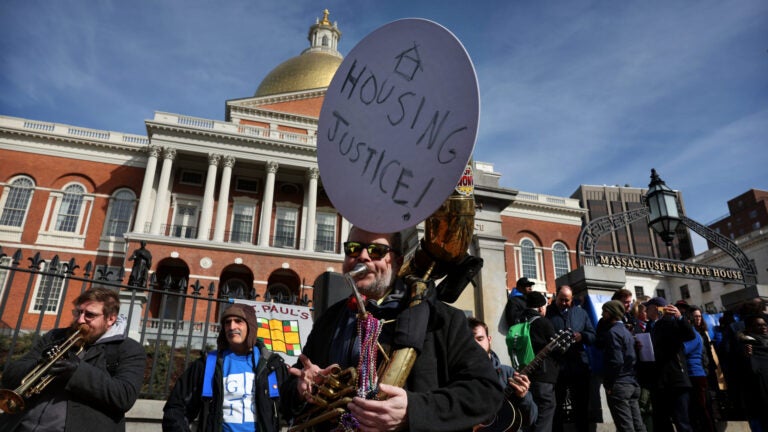Real Estate News
Greater Boston Real Estate Board launches campaign to muster opposition to transfer fees, while advocates hail it as a solution to the housing crisis.
One of Massachusetts’ largest real estate trade organizations has launched a campaign to muster opposition against a proposal that would allow cities and towns to levy a fee on some home and commercial property sales.
The Greater Boston Real Estate Board is calling and texting voters, urging them to oppose a transfer fee proposal wrapped into Governor Maura Healey’s $4 billion bond bill, which would allow municipalities to levy between 0.5% and 2% on sales of properties over $1 million in some areas.
Greg Vasil, CEO of the real estate board, which is behind the campaign, said transfer fees would raise transaction costs at a time when they are already high.
“We’re just going to keep going and do whatever we have to do because this is really bad tax policy for Massachusetts,” said Vasil said. “We’re already seeing the effects of the millionaires’ tax. And you know, this will be just another nail in our coffin. We’re on the road to mediocrity.”
The proposal, which has been referred to the House Committee on Ways and Means, comes at a time of crisis in the Massachusetts housing market, as buyers face low inventory, high mortgage rates, and climbing prices. If the median home price of a county is above $1 million, the fee is applied to properties that sell for more than that median value. And the fee is based on the amount above the $1 million threshold, not the entire sale price.
Ed Augustus, the state’s secretary of housing and livable communities, said in a statement to Boston.com that cities and towns need more tools to pay for affordable housing and have petitioned for a local-option transfer fee for years. Eighteen municipalities, including Boston, have already passed petitions for the fees.
While Vasil said municipalities “will always want to tax more because they always want more revenue for something,” advocates for the proposal say it would give cities and towns an additional tool to tackle the affordable housing shortage.
The Metropolitan Area Planning Council — an agency representatives from
Greater Boston communities partly govern — has two goals that this bond bill would advance: It would help increase the housing supply, as well as preserve and produce housing for low- to moderate-income renters and buyers, said executive director Marc Draisen.
“Sometimes I feel that organizations like GBREB are focused entirely on the first solution and not on the second solution,” Draisen said.
Tucker Holland, a consultant for Nantucket’s town government, said a prospective home buyer needs to earn seven times the area median income to afford the median value home on the island. There, the fee would affect sales that surpass $2.24 million. For a $3.24 million sale, a 0.5% fee would levy $5,000.
But Holland, who was also the island’s former housing director, said the fee would have generated $6 million last year, which leaders could’ve used to fight the “year-round housing crisis.” The fee would help the municipality support housing projects that the state cannot entirely cover, he said.
“Why should the Greater Boston Real Estate Board be the authority on what is good for the residents of Nantucket or any other municipality in the state?” Holland said. “Like, do we ask New Yorkers how Massachusetts should be run? I don’t think so.”
But amid low transaction volume, Vasil said, the revenue from the fees may fall short of expectations. Based on financial year 2022 transaction figures, the state estimates that it could have produced $392 million in revenue.
“It’s not going to produce what they think it’s going to produce because the number of transactions are down,” Vasil said.
And, citing a Tufts report, Vasil said only 30% of municipalities that adopted the Community Preservation Act, which allows municipalities to generate revenue through a property tax surcharge, use the funds for housing.
In March in Chicago, voters opposed a transfer fee, which Vasil said would have crippled the commercial real estate industry there. In Boston, downtown office spaces are losing value, he said, as shifting post-pandemic work habits have created trouble for these types of properties.
“We can’t look at these problems as: ‘Oh, it’s all, it’s progressive. It’s conservative,’” Vasil said. “It’s our basic economy. If you lose jobs here, we’re not going to have to worry about taxes, because people aren’t going to want to live here.”
Draisen agrees that commercial real estate is facing challenges as working conditions shift. High interest rates are a hurdle for these properties, he added, but the transfer fees would have a very small impact on commercial real estate.
“Those are very important,” Draisen said of the industry’s challenges, “but they are cyclical or shorter-term issues. We’re trying to craft a bill that will last for a few generations here.”
Draisen said he’d like the proposal to go even further. A $1 million minimum transaction is a little high, he said, especially in Western Massachusetts, where median prices are lower than in Boston. He’d also like to give cities and towns the right to end the exemption on the first $1 million or so of the transaction the proposal would exempt.
“Maybe we can’t get that far,” Draisen said. “But even if we pass the transfer fee with the current language, that would be a victory.”
Address Newsletter
Get the latest news on buying, selling, renting, home design, and more.
